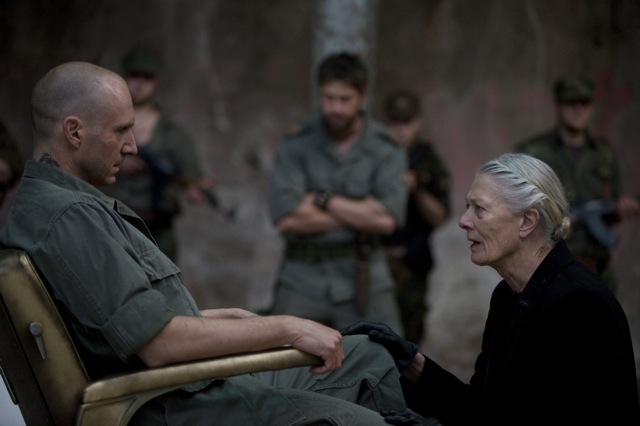CHICAGO – In anticipation of the scariest week of the year, HollywoodChicago.com launches its 2024 Movie Gifts series, which will suggest DVDs and collections for holiday giving.
Blu-ray Review: Vanessa Redgrave, Brian Cox Elevate Stirring ‘Coriolanus’
CHICAGO – I’ll never forget the moment I became a fan of Ralph Fiennes. It was while watching the behind-the-scenes documentary on the “Prince of Egypt” DVD. He was voicing the scene where his character, Ramses, shouts at Moses across the Red Sea. As he stood next to the mic, Fiennes’ entire body underwent a transformation, as if he were summoning a storm that coursed through his veins. He then let out the sort of howl that could easily part water.
The sheer largeness and theatricality of some Fiennes performances can easily drift into hamminess (as in the final act of “Deathly Hallows: Part 2”), but in his directorial debut, the actor strikes the perfect balance between prideful indignation and wounded strength, with a few bursts of blood-curdling ferocity. After taking on the titular tragic hero of “Coriolanus” onstage, Fiennes reprises the role in an ambitious modernization of Shakespeare’s under-appreciated masterwork. Audiences unfamiliar with the play may feel intimidated by the artful speech, but this is easily the most successful cinematic effort to stage the Bard’s classic piece in an updated setting.
 Blu-ray Rating: 4.5/5.0 |
Much of its success is due to the work of a peerless ensemble, Gerard Butler’s somewhat stilted line delivery notwithstanding. To be fair, Butler’s second-billing isn’t justified by his scant screen time and he barely has an opportunity to prove his merit. As Aufidius, the Volscian general waging war on Rome, Butler remains in the background, functioning as an ever-present threat to Roman general Caius Martius (Fiennes), who is bestowed with the third name of “Coriolanus” after his latest triumph on the battlefield. His mother, Volumnia (Vanessa Redgrave), is delighted by her son’s wounds, and claims that she would rather have 11 sons die for their country than have one who refused to fight. Coriolanus’ distain for the obstreperous, ignorant public clashes with the integrity of his principles. He’s a difficult character to like, but it’s effortless to share in his outrage when Brutus (Paul Jesson) and Sicinius (James Nesbitt) stir up trouble by swiftly turning public opinion against him. The highpoint of the film is Coriolanus’ enraged monologue at citizens so reliant on the views of noisy pundits that they never bother to think for themselves. This scene has lost none of its timeliness and power, and is one of several showstoppers brought to life by performers who truly understand the rhythm and tone of Shakespeare’s intricately nuanced words.

Ralph Fiennes, Gerard Butler and Vanessa Redgrave star in Coriolanus.
Photo credit: Larry D. Horricks/The Weinstein Company
Fretting behind oversized lenses, Brian Cox delivers a quietly heartbreaking performance as Menenius, the Roman senator who tries to redeem Coriolanus’ public image even in the aftermath of his exile. The incredibly versatile Jessica Chastain adds her luminous spark to the role of Coriolanus’ devastated wife. Yet it is Redgrave who walks away with the film. It is flat-out thrilling to watch one of the grand dames of cinema sink her teeth into such a dynamic, larger-than-life character. She relishes the dark humor in Volumnia’s calculating psyche, nails the bone-chilling textures of her dialogue and conveys fiery passion without leaving her teeth marks all over the scenery. She has the daunting task of appearing to be the most powerful, dominant force in the play, and she’s more than up to the task. The big confrontation between Coriolanus and Aufidius nearly feels anti-climactic, since it’s Volumnia’s psychological duel with her son that sets the screen aflame. This is the performance from 2011 most deserving of an aggressive awards campaign courtesy of The Weinstein Company. When Redgrave and Cox speak Shakespeare’s words, they resonate on a level that is utterly fresh and immediate. Suddenly, the 400-year-old text doesn’t sound a day old.
 Coriolanus was released on Blu-ray and DVD on May 29, 2012. Photo credit: Anchor Bay Entertainment |
“Coriolanus” is presented in 1080p High Definition (with a 2.35:1 aspect ratio), accompanied by English and Spanish subtitles and includes a Blu-ray and DVD of the film and its special features. A brief making-of featurette suggests that the violence that erupted in Serbia and Bosnia during the ’80s and ’90s is reflected in the film’s ambiguous, universalized setting. Cox says that the strength of this production lies in its ability to portray “the simplicity of Shakespeare,” thus making the work more accessible. Redgrave praises the Bard for “understanding women,” which may be the highest form of praise to give a playwright who’s been dead for centuries. Perhaps no other writer’s body of work could be adapted so fluidly over the course of human history. That’s partly because Shakespeare’s work was ahead of its time and created a language that was entirely its own.
What makes this combo pack a real winner is its candid audio commentary track where Fiennes dissects his own performance in great detail, while explaining his approach toward adaptation with his close collaborator John Logan. He notes hat the film’s opening title card, “A Place Called Rome,” was taken directly from John Osborne’s 1972 adaptation of the play, while some of Shakespeare’s dialogue was reworked into entirely new scenes, such as Aufidius’ ruthless interrogation. Television headlines were cleverly used as vessels for exposition. Fiennes felt that it would be appropriate to have ethnic diversity in the ruling class in order to mirror the election of Barack Obama. He also wanted to hint at the homoerotic attraction between Coriolanus and Aufidius that results in the final “penetration” scene. Though Logan and Fiennes sought to make the language more coherent for modern audiences, they ultimately resisted altering much of it, opting to preserve Shakespeare’s experimental use of verse. Though some audiences many find themselves pining for a “Modern English” subtitle option upon their initial viewing, the Bard is worth the effort, and so is this superlative film.
 | By MATT FAGERHOLM |


